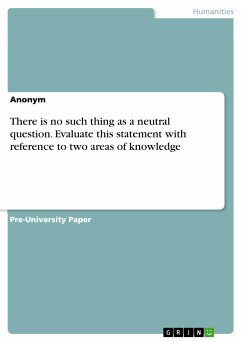Research Paper (undergraduate) from the year 2011 in the subject Philosophy - Practical (Ethics, Aesthetics, Culture, Nature, Right, ...), grade: 69, University of Essex (Department of Philosophy), language: English, abstract: The inferences we draw by employing a deontological assessment of morality may be flawed and at times exceedingly categorical, but does this insight in any sense legitimize its devaluation as an essential ethical theory? In what will follow, I intend to stress the levels of moral enquiry on which consequentialism defaults which will lay the argumentative foundation for depicting the merits deontological ethics comprises with this particular regard. Thereby, we should concentrate in particular on contrastive connotations of moral goodness and what the distinct types of goodness entail for our understanding of ethical theory. Considering the fact that by its very nature both theories are imperfect and in some cases even self-undermining it is highly counterproductive and illegitimate to dismiss one of them in favour of the other one. As a consequence, I will argue that deontology which relies on backward-looking justifications works best as a counterbalance to the forward-looking consequentialist approach. The idea is to show that this concept isn't an artificial limitation of consequentialism, but contrarily mirrors the way we intuitively think about morality to a greater extent than consequentialist ethics does. Even more, the following line of argument will expound the practical advantages an application of deontology necessarily possesses, an aspect that was often used to criticize this theory.
Dieser Download kann aus rechtlichen Gründen nur mit Rechnungsadresse in A, B, BG, CY, CZ, D, DK, EW, E, FIN, F, GR, HR, H, IRL, I, LT, L, LR, M, NL, PL, P, R, S, SLO, SK ausgeliefert werden.









